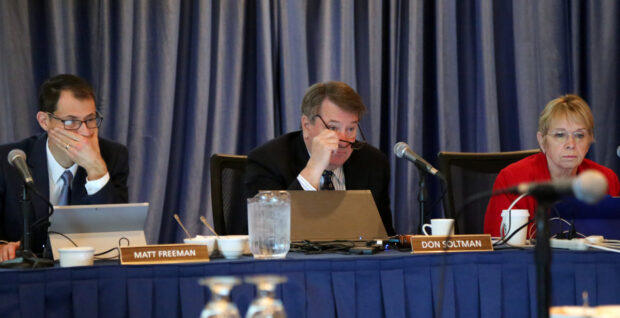Schools chief Sherri Ybarra and her staff view the State Department of Education as a support service, not a policing agency.
Recently, that philosophy has come in conflict with the other members of the State Board of Education.
Ybarra’s 2014 election to head the SDE came with a seat on the State Board.
Balancing between the State Board’s policy creation role and the SDE’s policy implementation role can be a delicate task.
“How she approaches her work outside sitting in the formal board meetings is working and supporting districts as the superintendent — as an elected official voted in by the people,” Ybarra’s spokesman Jeff Church said.
She chooses to lead the SDE’s 140-person team with a focus on helping schools — not punishing them. She supports local control with less state oversight.
That’s where balancing the two roles becomes delicate.
As a result of the Every Student Succeeds Act, the State Board and the SDE are both in the process of increasing state oversight and developing a statewide school accountability system. The system will likely require collecting more data, especially related to teacher performance and quality. The State Board wants to create a “data dashboard” that will publicly display multiple school performance metrics.
Meanwhile, Ybarra and her staff have systematically eliminated almost half of the data reporting requirements for local schools in the two years she has been in office.
Schools have not been held accountable to a grading system under Ybarra’s administration, which sought and received waivers from school accountability requirements of the old federal No Child Left Behind Act.
Ybarra also appeared unfazed when the Legislature moved oversight of teacher evaluation from her department to the State Board.
State Board members recently outvoted Ybarra 7-1 to pass a rule requiring the collection of four new data points supporters say are designed to increase transparency of teacher evaluations and justify whether teachers earn raises under the career ladder salary law.
Ybarra and her staff called this data “worthless” and “of no use” and a waste of time, despite the fact that some legislators and Gov. Butch Otter are seeking more accurate accountability surrounding teacher evaluations and education spending.
It also wasn’t entirely clearly who Ybarra was speaking on behalf of when she debated against collecting the extra data.
“We are general supervision (of public schools),” Ybarra said during the October meeting. “General. Not direct…”
Ybarra didn’t specify whom she meant by “we” and she never mentioned the State Board by name. But she did specifically reference the SDE during the exchange. That next day, her staff said she was referencing the State Board.
Instead of oversight, her major priorities for 2017 rest in a rural schools “support center” and to increase bullying awareness and education.
What Idaho law says
The State Department of Education is defined in Idaho law as “an executive agency of the State Board of Education.”
Idaho law states the SDE has “the responsibility for carrying out policies, procedures and duties authorized by law or established by the state board of education for all elementary and secondary school matters, and to administer grants for the promotion of science education.”
The Idaho Constitution creates the State Board and calls for the superintendent of public instruction to serve as a member.

The constitution outlines the State Board’s mission: “The general supervision of the state educational institutions and public school system of the state of Idaho, shall be vested in a State Board of Education.”
Idaho law states the State Board is responsible for “the general supervision, governance and control of the public school systems.”
How Ybarra supports schools
In practice, Ybarra and her staff say their role at the SDE is to serve as a support agency. They say they accomplish that by offering professional development training for educators, assisting districts with the implementation of Idaho Core Standards in English and math and providing support for English language learners in local districts.
Ybarra’s broad goal for education is for students “to persevere in life and be ready for college and careers.”
Prior to Ybarra’s election, the State Board adopted a similar goal that calls for 60 percent of Idaho’s 25- to 34-year-olds to hold some sort of a postsecondary degree or certificate by the year 2020.
In that way, accountability for public schools and student achievement is shared — between Ybarra, the seven appointed State Board members, Otter (who appoints all board members other than the state superintendent) and the Legislature (which provides funding and writes laws).
The different roles can be confusing, but the State Board’s spokesman believes the state superintendent’s presence strengthens the board.
“When we need to make policy, she contributes and is as much a part of the formation, debate and vote as any of the seven appointed board members,” spokesman Blake Youde said. “That’s the advantage of having her on the board. She understands clearly the intent of those policies and is able to execute them.”
